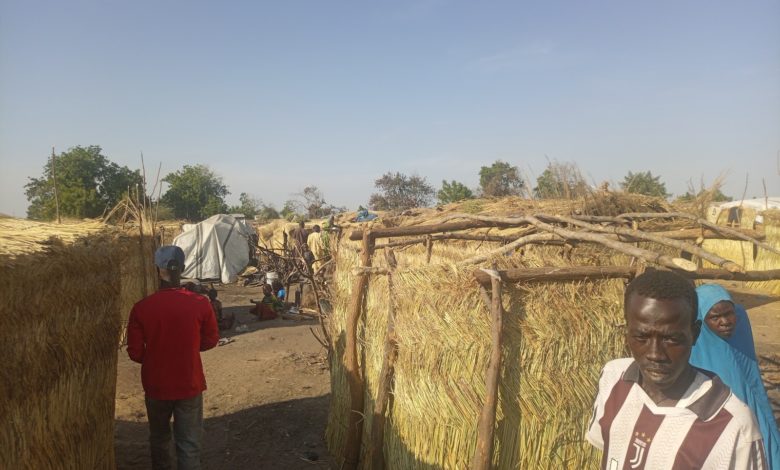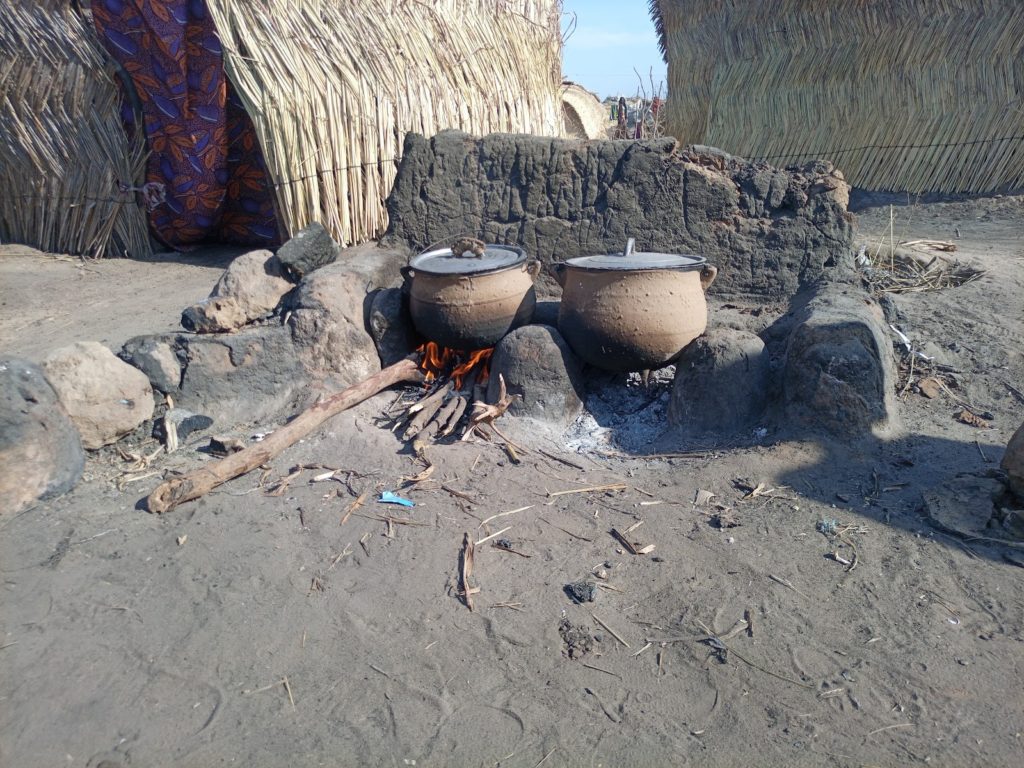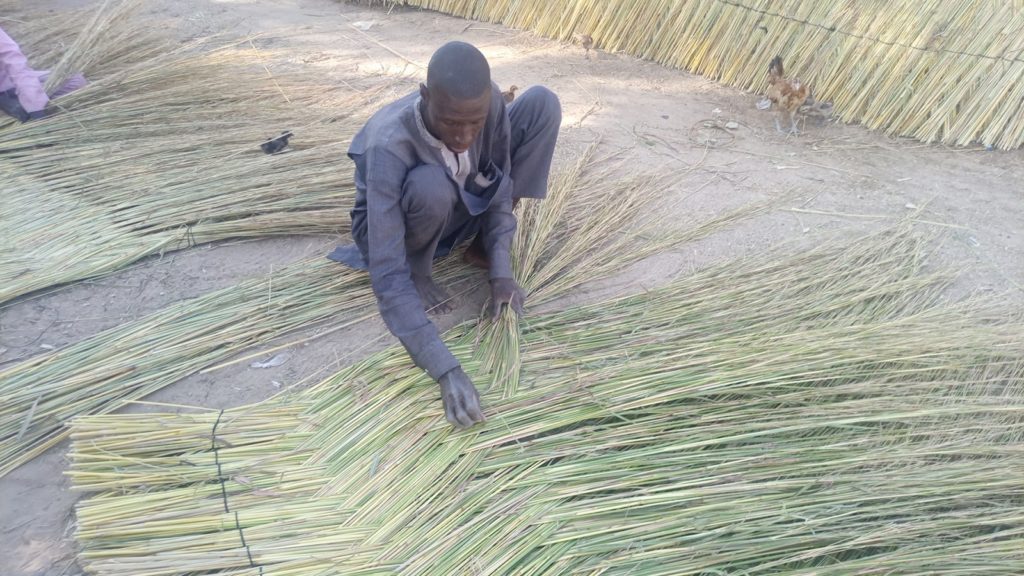Muna Camp Fire: With No Help From Government, Borno IDPs Take To Self-help
IDPs in Muna camp whose residences were burnt down in a series of fire disasters two weeks ago have, after waiting endlessly without help, resorted to thatch and grasses to rebuild their razed homes.

Two weeks after their homes were razed by a wildfire, hundreds of Internally Displaced Persons (IDP) at Muna IDP camp have begun to rebuild their burnt homes on their own, using highly inflammable materials like grasses and sticks.
Tired of waiting endlessly for the usual help from the state government and Non-governmental Organisations (NGOs), the affected IDPs decided to pick the pieces of their charred homes to save themselves from the harsh harmattan weather condition.
The IDPs said they had to resort to self-help as most of them could no longer afford to sleep out in the cold.
A HumAngle reporter visited the Muna Alabadawi camp located along the Maiduguri-Gamboru road where it was observed that most of the residents were busy using conflagration items to erect their destroyed homes.
“We have waited weeks, and unlike in the past, no official had come to talk to us about how they would be helping us to have a roof over our heads again,” said Usman Abba, an IDP from Mafa.
The reporter observed that the use of thatch and rafia had turned the camp into a potential site for more fire outbreaks.
“We have no other option other than using grass to rebuild our burnt homes because that is what we can afford since neither the government nor the NGOs have come to offer assistance to us.”

This HumAngle reporter also observed how the burnt camp had become a mini-construction site as men, women, and young boys were seen busy setting up their homes.
The State Emergency Management Agency (SEMA) had said, two weeks ago, that 275 households were gutted in the wildfire leaving about 1,620 persons without roofs over their heads.
But the IDPs lamented that the number of affected homes was more than what the government quoted. According to some of them, many houses were also destroyed, not by fire, but by the IDPs as a means of preventing the further spread of the inferno.
“As the fire was raging on getting lit from one hut to the other, we had to quickly pull down some of the houses to halt the wild spread of the fire,” another IDP said.
The IDPs said to rebuild each of the houses, which is about 12×12 feet in size, they require at least six sheets of the giant woven grasses, popularly known as Zana in Hausa.
“We don’t have the resources to rebuild the houses using tarpaulin or corrugated iron sheets, so some of us have to take the risk by venturing into the bush to fetch the grass, get it woven, and rebuild the destroyed homes.”
One of the female IDPs, Zara Mohammed, from Mafa local government, said it cost her family N1300 to buy a rolled sheet of Zana.

“We needed six sheets for our small house; some a bit less depending on the size, and we paid N1300 to get each of them,” he said.
But it is not all IDPs whose homes were burnt that could afford the cost of buying a Zana. This reporter spoke with some of the households who said their sons or husbands had to do days of paid labour in farms to raise money that could buy the woven sheets of giant grasses.
“We don’t have the money, but my 16-year-old son here, Abdullahi Yunus, took the responsibility of going to work on people’s farms to raise the money to buy the woven sheets of grasses,” said Aisha Muhammad mother of seven children.
She said the investment they have made in rebuilding their homes came at a cost that affected other aspects of their livelihood.
“Usually, our son used to go out daily to labour for what we would eat; but now that has affected our source of feeding. We had to sometimes stay hungry,” she said.
Abdullahi who was seen bringing in the last Zana sheet to the compound said “my mother is old and my father is late, so I have to go to people’s farms to work from morning to afternoon and they pay me N1500 with which I use to buy the Zana and woods to rebuild our home. It took me a whole week to buy all the seven sheets that rebuild our burnt homes.”
Another IDP said she has no one to help her rebuild her home or go onto the bush to fetch the giant grasses, hence she had to sell off some of her personal effects that she managed to rescue from the fire to her home.
A HumAngle reporter also found out that unaccompanied aged persons were among those worst hit by the fire outbreak.
An aged woman in her 70s only managed to escape the fire outbreak without saving any of her personal effects. Those who know her said she had lost her only surviving son to Boko Haram terrorists who shot at him while he was out in the farms some years ago.
“She has been sleeping out there in the cold in the ashes of her burnt home without proper clothing. We don’t know any of her immediate relatives since after her son was killed by Boko Haram until some of us contributed some money to get her a mat and blanket,” said Bakura.
The Borno SEMA had blamed the cause of the multiple fire outbreak on “dangerous cooking habits” that involved the residents cooking their meals on earthen stoves located close to the walls of their houses. And that during the harmattan period when the wind speed and direction changes, the IDPs found it difficult to control the flames of the fire while cooking.
With the harmattan season getting worse, and the IDPs now building their homes with materials that are inflammable, it is feared that more fire disasters may seem unavoidable, especially as the camp’s occupants still have their kitchens located within the thatched homes.
The Borno state government has not explained why it has not provided support to the IDPs in rebuilding their destroyed facilities, as it used to do in the past, although an official of the SEMA who spoke to HumAngle in confidence said: “The reluctance of government to help the Muna Camp victims of fire disaster rebuild their homes may not be unconnected with its decision to close all camps by end of December 2021.”
———————————————————————————————————————————————
This report is a partnership between HumAngle Media and Premium Times Center for Investigative Journalism (PTCIJ) under the ‘Accountability Journalism & Investigative Reporting for Deepening Democracy and Development’ project.
Support Our Journalism
There are millions of ordinary people affected by conflict in Africa whose stories are missing in the mainstream media. HumAngle is determined to tell those challenging and under-reported stories, hoping that the people impacted by these conflicts will find the safety and security they deserve.
To ensure that we continue to provide public service coverage, we have a small favour to ask you. We want you to be part of our journalistic endeavour by contributing a token to us.
Your donation will further promote a robust, free, and independent media.
Donate HereStay Closer To The Stories That Matter




